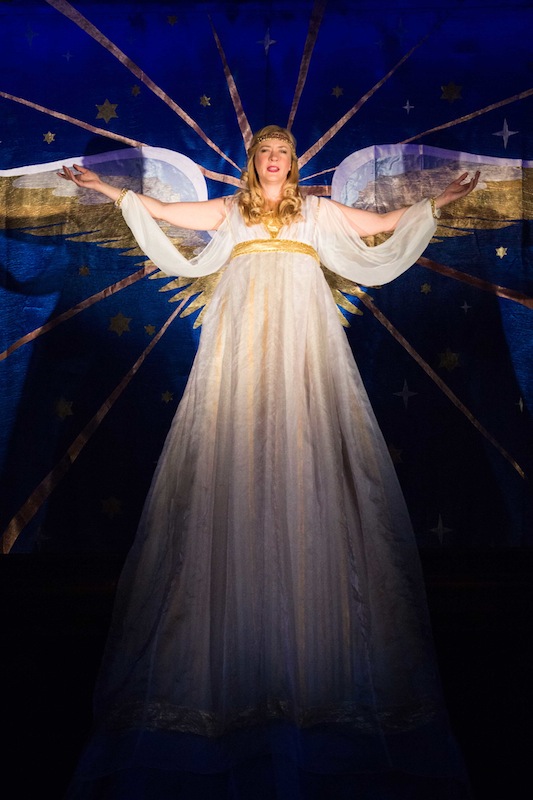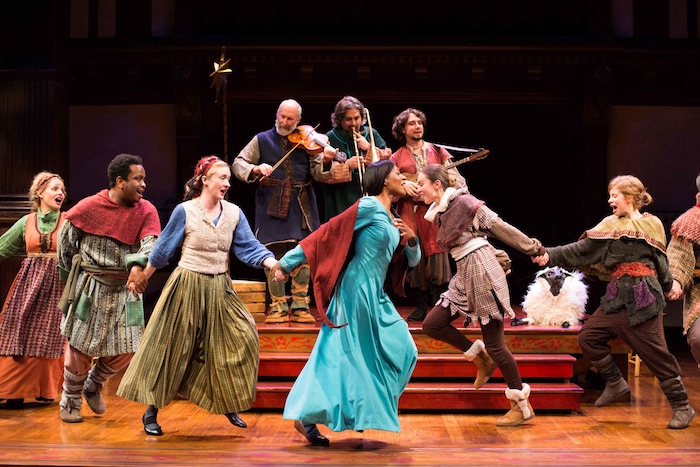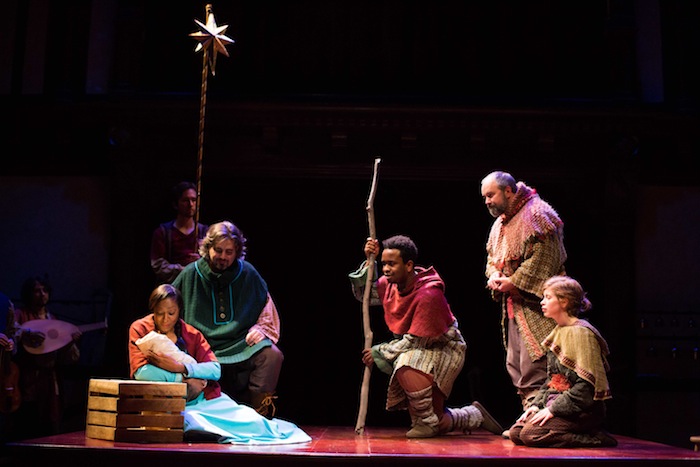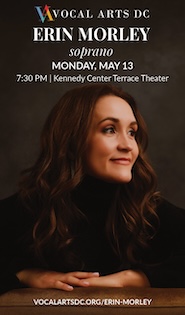Folger Consort revisits “Shepherds’ Play” with charming and magical results

Emily Noël as the Angel in the Folger Consort’s “The Second Shepherds’ Play.” Photo Brittany Diliberto
People like to attend holiday-themed concerts in December, and nearly all of Washington’s presenters offer something that fits the bill. Along with the more common Nutcracker, Messiah, Amahl, and Christmas carol options are concerts of historical music for Christmas.
In most years one of the best of this type comes from the Folger Consort. This year the early music ensemble has returned to its wildly successful 2007 production of The Second Shepherds’ Play, performed Friday night in the Elizabethan Theater of the Folger Shakespeare Library, which was beautifully trimmed for the season. (In a touching gesture, the Folger Consort has dedicated these performances to the talented multi-instrumentalist Tom Zajac, who died last year. He was a memorable part of many performances by the Consort.)
The Second Shepherds’ Play is a late medieval mystery play, associated with the Yorkshire town of Wakefield, one of thirty-two such plays recorded in a book known as the Towneley manuscript. Director Mary Hall Surface has adapted the Middle English text, rendering it comprehensible to a modern audience while hewing as closely as possible to the original. The characters speak about music, singing themselves and hearing the singing of an angel in the memorable climax of the work. The Towneley scribe recorded no actual music; yet the ingenuity of this production is that Robert Eisenstein, music director of the Folger Consort, has put together a selection of English music that could have been known to the author and actors of the original play.
Actors Louis E. Davis and Matthew R. Wilson were charming as the two older shepherds, Coll and Gib, who have to weather the cold of the Yorkshire moors to guard their herds of animals. At the start of the play they complain of the gentry who keep them down, played by a cast member wearing finer clothes and a frowning mask. At the same time they lord their own power over the teenage Third Shepherd, Daw, played with wry humor by Megan Graves. The Third Shepherd, last to appear on stage, is the one who seems to understand most about the favor God bestows on the shepherds at the end of the play. “We that walk in the nights, our cattle to keep,” Daw says in the first scene, “We see sudden sights when other men sleep.” Called by an angel, they seem to leave the English Middle Ages and make an appearance as the shepherds at the birth of Christ in Bethlehem.

Photo: Brittany Diliberto
The whole cast, most of whom are not trained singers, gave rustic charm to carols like Nova, nova, Ave fit ex Eva (News, news, let Eva be changed to Ave), Greensleeves (with its original text), and the Sommerset Wassail. The aptly named soprano Emily Noël, heard with the Folger Consort and Derek Jacobi in October did most of the heavy lifting vocally. Her light soprano was limpid and clear in the beautiful Annunciation carol Angelus ad virginem. Her appearance as the angel, accompanied by bells, is the production’s most memorable moment (costumes by Adalia Tonneyck), her glassy voice ringing out on an excerpt of the Gloria chant from the Sarum rite, and a return of Angelus ad virginem.
Ryan Sellers (Mak) and especially Tonya Beckman (Gill) provided comic relief as the poor couple, already burdened with many children, who steal and plan to eat one of the shepherds’ sheep, played convincingly by puppeteer Malinda Kathleen Reese. In a twist that cleverly foreshadows the holy birth that ends the play, with Lilian Oben’s earnest Virgin Mary, Gill tries to pass off the sheep as her latest newborn, hiding it in a cradle. Puppets (designed by Aaron Cromie) provide cute interludes for scene changes, including a memorable wolf that prowls in Daw’s dream about Mak stealing the sheep, and a wind machine and waved blue banners give a sense of the howling cold on the moors. A few dance numbers for the cast (choreography by Emma Jaster) are joyous and simple.
Musicians Robert Eisenstein (fiddle, viol), Brian Kay (lute, psaltery, mouth harp), and Daniel Meyers (transverse flute, bagpipe) provided a seamless musical tapestry, all playing from memory. Kay’s performance on the lute at the opening of the second act made a pleasing scene, as the other musicians stood by to listen in appreciation. The trained musicians made the play a much stronger work, as in the carol Sweet Was the Song the Virgin Sung, with pleasing embellishments added by Noël and all three musicians. The unaccompanied Coventry Carol, with its dissonant cross-relations treated with care, made a poignant sonic backdrop for the shepherds’ visit to the manger, as the sheep itself bowed before the infant Jesus.
The Second Shepherds’ Play runs through December 21. folger.edu/events/second-shepherds-play; 202-544-7077.

Lilian Oben (as Mary), along with shepherds (l. to r.) Daniel Meyers, Louis E. Davis, Matthew R. Wilson, and Megan Graves in “The Second Shepherds’ Play.” Photo: Brittany Diliberto



